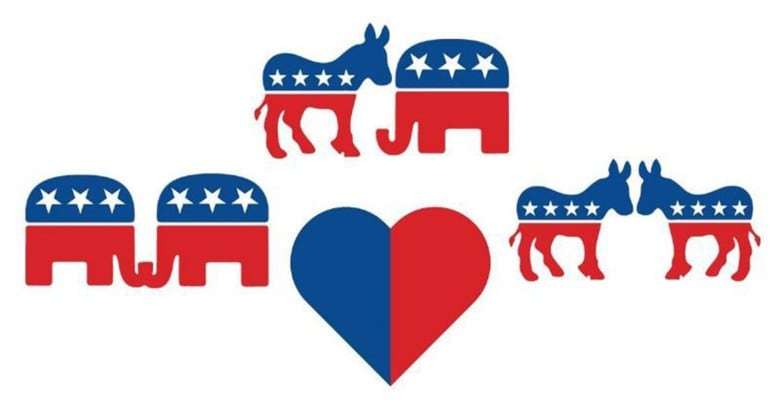How federalism can help save the failing "marriage" between the red and blue states

Prominent columnist Megan McArdle argues that the increasingly relationship between "red" and "blue" American has come to resemble a failing marriage:
I haven't been thinking about [the dynamics of marital breakup because my marriage is on the rocks…. It's another marriage I've been watching disintegrate: the one between red and blue states.
While traveling a few months back, I ended up chatting with a divorce attorney, who observed that what we're seeing in America right now bears a startling resemblance to what he sees happen with many of his clients. They've lost sight of what they ever liked about each other; in fact, they've even lost sight of their own self-interest. All they can see is their grievances, from annoying habits to serious wrongs. The other party, of course, generally has their own set of grievances. There is a sort of geometric progression of outrage, where whatever you do to the other side is justified by whatever they did last. They, of course, offer similar justifications for their own behavior.
There is a lot of truth to McArdle's description of our political situation. Partisan bias and hatred of the opposing party are growing, and the 2016 election certainly did not improve the situation. The problem is exacerbated by growing polarization, which makes partisans on both sides even more reluctant to do anything that might help the other.
What can we do to address this sorry state of affairs? McArdle counsels greater forbearance, and willingness to make concessions to the other side - much in the same way as mutual compromise is essential to a successful marriage:
The more determined you are to win every battle, the more likely you are to lose what's important: the person you love so much that you have chosen to spend the rest of your life with them. And so every time you have a real disagreement… you have to think carefully before you decide to have that fight. Is this really the hill that you're willing to let your marriage die on?…
Some hills are worth dying on. But a lot of them are of no strategic value in gaining your ultimate objective: a long and happy partnership…
It is certainly true that successful marriage requires compromise and forbearance. The same can be said of a successful political system. But McArdle overlooks the reality that compromise is easier between people who don't disagree on so many fundamental issues to begin with. One of the most important predictors of a successful marriage is having similar goals and values. It's a lot easier to make concessions when you know you won't have to make them too often, or on too many important issues.
An atheist with a bohemian lifestyle and a strait-laced religious fundamentalist can potentially have a successful marriage. But it's a lot less likely to end happily than one where each finds a partner closer to their respective values.
Unfortunately, the "marriage" between red and blue America is in fact one between groups with widely divergent preferences on many issues. The more issues the "couple" has to decide together, the greater the potential for conflict.
Fortunately, a political union need not be as close a relationship as a marriage usually is. Red and blue America may not be able to spend some time completely apart. But they don't have to do so many things together.
Today, the federal government has control over an extraordinarily wide range of issues, everything from health care to drug prohibition, to light bulbs and toilet flows. By decentralizing more power to the state and local level, or to the private sector, we can reduce the number of issues on which a one-size-fits-all decision has to be made. There will be less need to make painful compromises and concessions if each side can get their own way in their own state, locality, or private planned community.
We can also take steps to make mobility easier, so that people unhappy with their current jurisdiction have greater opportunity to "vote with their feet" for more congenial alternatives. Such foot voting need not and should not result in complete partisan segregation. Many people, myself included, have preferences that don't fit neatly along a standard left-right or red-blue continuum. But the combination of decentralization and opportunities for foot voting can result in greater freedom and happiness for a wide range of people with divergent preferences.
A political family that doesn't have to do so much together can be a happier family with fewer dangerous zero-sum conflicts. It may not be quite like a successful marriage. But perhaps a less intimate form of political relationship is precisely what we need. People who are too different to be good spouses might nonetheless make good friends or relatives - as long as they don't have to do too many things together. Uncle Red and Cousin Blue might be a lot more likable if you didn't have to worry about them controlling too many aspects of your life.
Minimizing political conflict is not the only issue we need to weigh in considering the optimal degree of political centralization. And there are some policies - global warming and national defense are obvious examples - that cannot be significantly decentralized.
But a great many issues currently decided in Washington can well be devolved to lower levels of government, at least to a large degree. If Denmark, Switzerland, or Luxembourg can have their own health care, pension, and education policies, so can American states or even cities, many of which have much larger populations. With many issues, we can even decentralize further than that, all the way to the level of private sector decision-making in the market and civil society. If we want to reduce the dangerously dysfunctional level of conflict between red and blue America, one promising strategy is to work together to make federalism great again.
